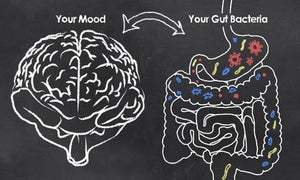The Latest Research on the Gut-Brain Connection
November 14, 2016

If you have ever felt butterflies in your stomach or experienced a queasy feeling, or even had a ‘gut feeling’, then you know that there is a real connection between your gut and your brain.
Many refer to the gut as the body’s “second brain” because of the complicated network of nerves in the digestive tract. This network of nerves, known as the enteric nervous system (ENS), regulates digestion and sends messages to the brain regarding the status of the gastrointestinal tract. The ENS can also alter brain health, affecting your thoughts and feelings.
Scientists have known about the connection between the brain and the gastrointestinal tract, known as the gut-brain axis, for years. Gastroenterologist and professor in the Departments of Medicine, Physiology and Psychiatry at the David Geffen School of Medicine at UCLA, Emeran Mayer, is a pioneer of medical research into the gut-brain axis. “Gut-brain communication is firmly established. There’s no question,” Mayer says in an interview with Gut Microbiota for Health (GMFH). “There’s extensive animal data and clinical observations: if you feel stressed you will feel the effects in your gut, if you feel anxious you notice the butterflies in your stomach, if you’re depressed, you may develop constipation.”
The Second Brain, Enteric Nervous System and the Vagus Nerve
The ENS is two thin layers of nerve cells lining the gastrointestinal tract. These two layers contain a complex network of more than 100 million nerve cells, more than the spinal cord.
Unlike the big brain in your skull, your second brain is not capable of thought. It can communicate with the brain, however, sometimes with profound results. Its primary role is controlling every aspect of digestion, such as swallowing, releasing adequate amounts of the correct enzymes to break down various types of food, controlling the flow of blood absorbing nutrients, and elimination.
This connection begins at the earliest stage of life. In the womb, embryos develop a clump of tissue known as the neural crest. One section of the neural crest turns into the central nervous system, which consists of the brain and spinal cord, while the other turns into the ENS. Later in development, the two sections connect through a cable known as the vagus nerve.
ENS nerve cells send signals through the vagus nerve to the brain. These messages may trigger significant emotional shifts in people with digestion problems. Microbes living in the gut, known collectively as gut microbiota, can also produce chemicals that alter the brain.
What Happens in the Gut Can Affect the Brain
Gut microbiota seems to be altered in a number of brain-related conditions. For many years, doctors thought anxiety and depression triggered abdominal symptoms but the latest research on the gut-brain connection suggest that it may also be the other way around – irritation in the digestive system may send signals to the brain to trigger mood changes.
Research associates an absence of gut microbiota in laboratory mice with poor exercise endurance. Clinical sampling shows the composition of gut microbiota in patients with major depressive disorders were significantly different from those without depression. Transplanting the microbiota from the gut of a patient with depression into a lab animal causes the animal to develop depressive symptoms.
In other research, scientists established a connection between the gut and depression. Researchers separated newborn mice from their mothers for three hours a day. Scientists then confirmed these mice demonstrated depression-like behaviors, produced high levels of the stress hormone, corticosterone, and suffered from gut dysfunction. Researchers repeated the experiment with microbiota-free mice; these mice suffered gut dysfunction and high stress hormones, but not anxiety or depression. The findings suggest that bacteria are necessary for symptoms of depression and anxiety.
These results suggest that probiotic treatment and probiotic-friendly diets could be useful in preventing or improving consequences of stress, especially stress that develops early in life.
The post The Latest Research on the Gut-Brain Connection appeared first on Natren Probiotics Blog.





Leave a comment